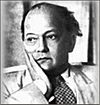- Syed Mujtaba Ali
-
Syed Mujtaba Ali
সৈয়দ মুজতবা আলী
Syed Mujtaba AliBorn September 13, 1904
KarimganjDied February 11, 1974 (aged 69) Nationality Bengali Ethnicity Bengali Occupation Writer Religion Islam Syed Mujtaba Ali (Bengali: সৈয়দ মুজতবা আলী) (1904–1974) was a renowned Bengali author, academician, scholar and linguist. He was born in present Karimganj District Assam of undivided Sylhet in Bengal.
Contents
Education and early career
In 1919, Syed Mujtaba Ali was inspired by Rabindranath Tagore and started writing to the poet. In 1921, Mujtaba joined the Indian freedom struggle and left his school in Sylhet. He went to Visva-Bharati University in Santiniketan and graduated in 1926.He was the first graduate of the university. Later, he went to Kabul and worked in the education department (1927–1929). From 1929 to 1932 he studied at the universities in Berlin, London, Paris and Bonn, earning a PhD in comparative religious studies from the latter with a dissertation on the Khojas.
In 1934-1935 he studied at the Al-Azhar University in Cairo. Subsequently, he taught at colleges in Baroda (1936–1944) and Bogra (1949).
Language activism
After the Partition of India into India and Pakistan in 1947, Syed Mujtaba Ali went from India to the then East Pakistan, his motherland. He was a language activist and a supporter of Bengali as the national language of East Pakistan.[1] In 1948, being the principal of Azizul Huq College, Bogra, he wrote an essay, 'The State Language of East Pakistan', which was printed in Chaturanga of Kolkata.
During that time, the West Pakistan Rulers tried to impose Urdu as the only state language of East Pakistan while Bengali was spoken by most of the people. The government of Pakistan wanted an explanation. Mujtaba Ali resigned and went to India.
Further career
After a brief stint at Calcutta University (1950), Mujtaba Ali became Secretary of the Indian Council for Cultural Relations and editor of its Arabic journal Thaqafatul Hind. From 1952 to 1956 he worked for All India Radio at New Delhi, Cuttack and Patna. Finally, he was professor at Visva-Bharati University (1956–1964).
Final years
After the liberation of Bangladesh, Syed Mujtaba Ali returned to his native land in 1972, where he died soon after.
Linguistic abilities
Syed Mujtaba Ali was a multilingual person and he knew 15 languages. Ali knew French, German, Italian, Arabic, Persian, Urdu, Hindi, Sanskrit, Marathi, Gujarati, Pashtu, English and several dialects of Bengali. He is the greatest contributor for a variety of bright colours to the Bengali language through his writings. He imparted the best of Perso-Arabic to Bengali, and showed the path of synthesis better than all his predecessors and successors. North India had been the grounds for the most bitter fight between Hindus and Muslims in the medieval times. But the same North India produced the highest synthesis of culture through secular architecture of the Mughals and the Rajputs, the miniature paintings of Kangra, Guler, Rajasthan, etc., the Urdu language, and above all through Hindustani Classical Music.
Critic
Syed Mujtaba Ali was a great critic of the British. His writings are profuse in sarcastic remarks about the colonial rulers of India. At times, he could even go beyond all his contemporaries in his contempt for the rulers of British India.
Works
Extracts from Syed Mujtaba Ali’s literary works are included in the curriculum of school level, secondary, higher secondary and graduation level Bengali Literature in both Bangladesh and India, particularly in the states of West Bengal and Tripura.
Books
- Deshe Bideshe[1948]
- Panchatantra [1952]
- Obishashsho [1955]
- Chacha Kahini [1955]
- Mayurkanthi [1957]
- Joley Dangay [1957]
- Dhupchaya [1958]
- Shabnam [1960]
- Chaturanga [1960]
- Sreshtho Golpo [1961]
- Porosh Pathor [1962]
- Bahubichitra [1962]
- Bhoboghure O Onnanyo [1962]
- Sreshtha Ramma Rochona [1962]
- Tunimem [1964]
- Duhara [1966]
- Pachandashai [1967]
- Shahriyar [1969]
- Hitler [1970]
- Kotona Asrujal [1971]
- Musafir [1971]
- Prem
- Dandya Madhur
- Tulanahina
- Rajaujeer
Family
Syed Mujtaba Ali has two sons namely Syed Musharraf Ali, Firoz and Syed Zaghlul Ali, Kabir (Bhojuram). Syed Mujtaba Ali was married to Rabeya Khatun. His elder son has two sons (Syed Muddassir Ali, Syed Muzzammil Ali) and a daughter (Syeda Zeenatunnessa Miliya). His younger son has only one son (Syed Mashrur Ali).Syeda Zunaira Ali is the youngest member of the Mujtaba family. They all live together in Dhanmondi 1 at their own residence Prantik which was named by Mujtaba.
References
- Saiyad Mujtaba Ali Rachanabali (complete works), edited by Gajendrakumar Mitra, Sumathanath Ghosh, Sabitendranath Ray and Manish Chakrabarty, eleven volumes published by Mitra O Ghosh (Kolkata) 1974-1983 (with various editions following).
- Saiyad Mujtaba Ali: Jibankatha, by Nurur Rahman Khan, published by Asiatic Society of Bangladesh (Dhaka) 1990.
- Mujtaba Sahityer Rupbaichitrya o Rachanashaili, by Nurur Rahman Khan, published by Bangla Academy (Dhaka) 1990.
- Prasanga: Mujtaba Ali, edited by Bijanbihari Purakayastha, published by Nabapatra Prakashan (Kalikata) 1998 (first published as Mujtaba Prasanga in Sylhet in 1977).
- Syed Mujtaba Ali: Proshongo Oproshongo by Golam Mostakim, who were close with Syed Mujtaba Ali from 1971 to 1974, till Syed Mujtaba Ali's death. The book illustrates Syed Mujtaba Ali as a person rather than a personality. Published by Student Ways, Dhaka, Bangladesh in 1995.
Footnotes
External links
Categories:- Bangladeshi writers
- Bengali writers
- Bengali-language writers
- Bengali novelists
- Bangladeshi novelists
- 1904 births
- 1974 deaths
- Visva-Bharati University alumni
- Humboldt University of Berlin alumni
- University of Bonn alumni
- Alumni of the University of London
- University of Paris alumni
- Al-Azhar University alumni
- University of Calcutta faculty
- Visva-Bharati University faculty
- Recipients of the Ananda Purashkar
- People from Sylhet
Wikimedia Foundation. 2010.
